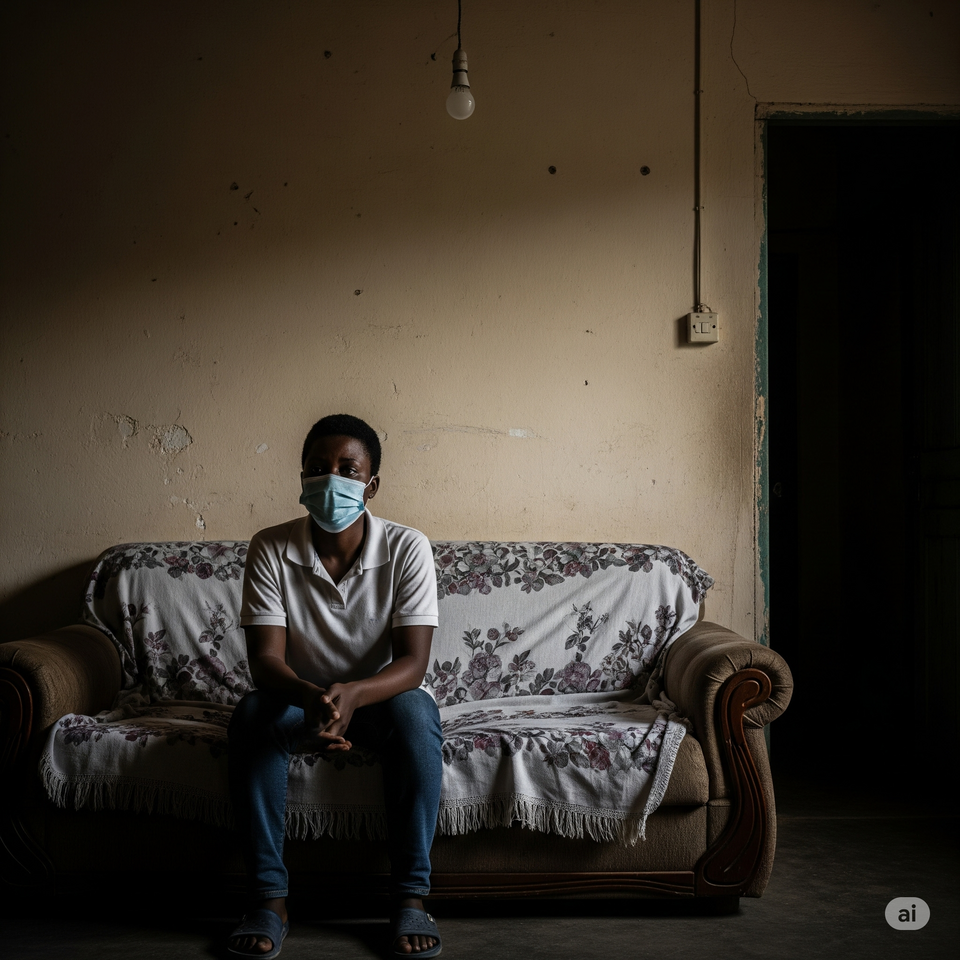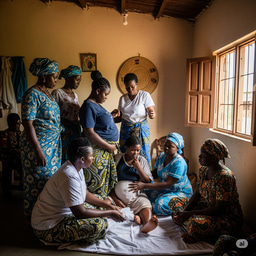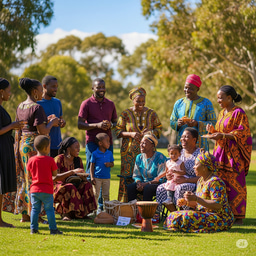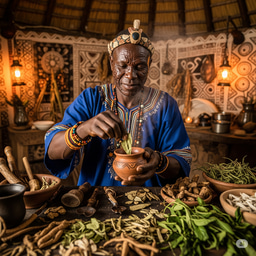Echoes of Epidemics: Psychological Distress in Sierra Leone During COVID-19
Published in Public Health and Behavioural Sciences & Psychology

The global COVID-19 pandemic, while often discussed through lenses of infection rates and vaccine rollouts, left a profound and often unseen impact on mental health worldwide. In Sierra Leone, a nation still grappling with the lingering trauma of the 2013-2016 Ebola outbreak, the psychological burden of COVID-19 presented a unique and critical challenge. Our recent cross-sectional study, "Psychological distress and coping mechanisms due to the COVID-19 pandemic among the adult population in Bo Sierra Leone," sheds light on this hidden crisis, revealing the significant levels of mental distress experienced by adults and the factors influencing their ability to cope.
Challenges: A Heavy Toll on Mental Well-being
Our findings paint a stark picture: a substantial proportion of adults in Bo district, Sierra Leone, experienced high levels of psychological distress due to the COVID-19 pandemic. Specifically, approximately one-third of the 502 participants exhibited "very high" levels of psychological distress, with an average distress score of 22.96 out of a possible 50. This widespread distress was compounded by pervasive fear, with the vast majority (83.7%) of participants reporting being fearful of COVID-19. Many strongly agreed they were afraid of COVID-19, uncomfortable thinking about it, and feared losing their lives due to the virus. The constant influx of news and stories on social media also contributed to nervousness and anxiety for nearly two-thirds of the participants.
Several factors significantly increased the odds of experiencing moderate to severe psychological distress. Individuals with a known pre-existing health condition were four times more likely to report higher distress levels. This is understandable, as disruptions in healthcare systems due to the pandemic, such as postponed medical treatments, would have caused additional distress for those relying on regular care.
Furthermore, those who had provided care to a family member or patient with known or suspected COVID-19 faced significantly higher odds of psychological distress, more than four times that of others. Caregivers were often in close contact with COVID-19 patients, heightening their risk of infection and leading to substantial distress and anxiety about contracting or spreading the virus. The uncertainty surrounding the virus and a lack of adequate personal protective equipment (PPE) in the early stages of the pandemic likely overwhelmed many of these individuals.
Perhaps one of the most profound stressors was the experience of loss. Participants who knew someone who had died from COVID-19 had over three times higher odds of psychological distress. Grieving individuals experienced a range of intense emotions, including sadness, anger, guilt, and helplessness, all contributing to their mental burden. The inability to say goodbye or adequately prepare for the loss intensified feelings of distress and shock.
Beyond these personal factors, broader societal challenges contributed to the psychological strain. The government of Sierra Leone implemented various public health measures, including curfews, inter-district lockdowns, and school closures. While necessary, these restrictions profoundly impacted the social, psychological, and economic well-being of Sierra Leoneans. The pandemic led to fear contagion, unemployment, family separations, domestic violence, and increased loneliness, alongside an "overabundance of (mis)information on social media". These factors all acted as potential stressors and risk factors for mental health disorders. The economic decline due to COVID-19, impacting global demand for Sierra Leone's primary exports, also contributed to household income reduction and increased extreme poverty, fueling anxiety.
Successes: Resilience and the Power of Connection
Despite the overwhelming challenges, our study also highlighted critical successes in coping mechanisms and the protective role of social support. While half of the participants were categorized as "low resilient copers", a significant portion exhibited moderate to high resilient coping skills. Many participants actively looked for creative ways to alter difficult situations, believed they could control their reactions, and thought they could grow in positive ways by dealing with adversity. These inherent strengths within the population underscore a degree of resilience in the face of widespread distress.
Crucially, our findings strongly demonstrated the protective effect of social support. Participants with increased functional social support had significantly lower odds of psychological distress compared to those with low support. This highlights the vital role that community and interpersonal connections play in buffering mental health impacts during a crisis. Statements such as "having people who care about them," "getting love and affection," and "chances to talk to someone about problems" were key indicators of this supportive network. Nearly half of the participants reported high social support. This collective strength, where individuals could lean on their social networks for emotional and practical assistance, proved to be a powerful antidote to the isolating effects of the pandemic.
Perhaps surprisingly, our study also found that frontline workers in Sierra Leone had lower odds of psychological distress. This runs contrary to studies in other contexts that often report high burnout and distress among healthcare professionals during pandemics. This unexpected finding could be attributed to a combination of factors, including the previous experience with the Ebola outbreak which may have better prepared them psychologically, or perhaps a stronger sense of purpose and community support within their roles. This resilience among frontline workers is a testament to their strength and adaptability, offering valuable insights for future emergency preparedness.
Implications for Future Research and Public Health
Our study addresses a critical knowledge gap concerning the psychological impact of COVID-19 in Sierra Leone, where such data was previously scarce. The findings unequivocally underscore the urgent need for targeted public health interventions. It is paramount to design and implement programs that not only minimize COVID-19 stressors but also actively enhance coping skills and strengthen social support networks within communities.
Future research should delve deeper into the specific, culturally relevant coping mechanisms employed by Sierra Leoneans and how these can be formally integrated into mental health support programs. Understanding the interplay between traditional coping strategies, religious beliefs, and modern psychological interventions could lead to more effective and acceptable mental health services. Furthermore, studies are needed to explore how public health messaging can be tailored to address prevalent fears and misinformation without causing further distress, particularly given the high media attention COVID-19 received despite a relatively low transmission risk in the country. Research into long-term psychological impacts, especially considering the compounding trauma from the Ebola outbreak, is also vital.
Untold Stories: Echoes of the Past, Shaping the Present
The numbers in our study, while statistically significant, represent countless "untold stories" of individual struggle and resilience. The pervasive psychological distress in Bo, Sierra Leone, cannot be fully understood without acknowledging the nation's recent history with the Ebola epidemic. The collective memory of that devastating outbreak, with its associated fear, stigmatization, and disruption of daily life, likely primed the population for heightened anxiety during COVID-19. The initial public health measures implemented during COVID-19, such as quarantines and restrictions, would have stirred echoes of the Ebola response, potentially intensifying feelings of fear and vulnerability.
Furthermore, the socio-economic context of Sierra Leone plays a crucial, though often overlooked, role. As a country heavily reliant on minerals and agricultural products for foreign exchange, the global economic decline triggered by COVID-19 directly impacted livelihoods, leading to decreased demand for commodities, supply chain disruptions, and price hikes. The projected "huge and devastating" socio-economic impact in the coming years, including reductions in GDP growth, decreased household income, and increases in extreme poverty, reveals a layer of suffering beyond the direct health effects of the virus. These economic anxieties undoubtedly exacerbated psychological distress, creating a multi-layered crisis for many families.
The contrasting finding of lower psychological distress among frontline workers in Sierra Leone compared to other regions also tells an important story. It suggests that pre-existing community structures, previous experience with epidemic response, or unique cultural coping mechanisms might have provided a buffer against mental health deterioration in this specific group. This points to the need for a more localized, context-specific understanding of resilience rather than applying universal assumptions.
In essence, our study highlights that the psychological toll of COVID-19 in Sierra Leone was not solely about the virus itself but was a complex interplay of public health measures, economic vulnerabilities, and the enduring legacy of past traumas. By bringing these "untold stories" to the forefront, we hope to advocate for mental health support systems that are culturally informed, historically aware, and deeply integrated into broader community well-being initiatives. Addressing psychological distress in a post-pandemic world requires not just clinical interventions but a holistic approach that acknowledges and supports the inherent resilience within communities, while also confronting the systemic factors that exacerbate suffering.




Please sign in or register for FREE
If you are a registered user on Research Communities by Springer Nature, please sign in